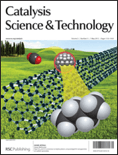
Catalysis Science & Technology
Scope & Guideline
Pioneering Discoveries in Catalytic Science
Introduction
Aims and Scopes
- Catalyst Design and Synthesis:
The journal explores innovative methods for designing and synthesizing new catalysts, including metal-organic frameworks (MOFs), nanostructured materials, and hybrid systems that enhance catalytic performance. - Mechanistic Studies:
A significant focus on understanding the fundamental mechanisms of catalytic processes through experimental and computational studies, including DFT calculations and in situ characterization techniques. - Environmental and Energy Applications:
Research on catalysts for environmental remediation, such as photocatalytic degradation of pollutants and CO2 reduction, as well as catalysts for renewable energy applications, including hydrogen production and biomass conversion. - Heterogeneous and Homogeneous Catalysis:
The journal publishes studies on both heterogeneous and homogeneous catalytic systems, investigating their performance, selectivity, and stability under various reaction conditions. - Machine Learning and Data-Driven Approaches:
An increasing emphasis on the application of machine learning and data analytics to optimize catalyst design and predict catalytic performance.
Trending and Emerging
- Sustainable and Green Catalysis:
There is a growing emphasis on developing catalysts that facilitate sustainable processes, including renewable feedstocks, waste valorization, and energy-efficient reactions. - Photocatalysis and Photoelectrocatalysis:
Research into photocatalytic systems that harness solar energy for chemical transformations is on the rise, with a focus on visible-light-driven reactions for CO2 reduction and pollutant degradation. - Electrocatalysis:
Electrocatalytic processes, particularly for CO2 reduction and hydrogen evolution, are increasingly prominent, driven by the need for renewable energy solutions and energy storage technologies. - Bimetallic and Alloy Catalysts:
The exploration of bimetallic and alloy catalysts is gaining popularity due to their potential for enhanced catalytic activity and selectivity through synergistic effects. - Machine Learning in Catalysis:
The integration of machine learning and artificial intelligence into catalyst discovery and optimization processes is emerging as a significant trend, streamlining research and development efforts.
Declining or Waning
- Traditional Catalyst Characterization Methods:
There has been a noticeable decrease in the publication of studies solely focused on conventional characterization techniques (e.g., XRD, BET surface area measurements) without integrating advanced methodologies or novel insights. - Single-Use Catalysts:
Research on single-use or disposable catalysts has waned as the field moves towards sustainability and the development of catalysts that can be reused or regenerated. - Bulk Catalysis:
The focus on bulk catalysis processes has diminished, with a shift towards more complex, multi-functional systems that offer enhanced selectivity and efficiency. - Classic Organometallic Catalysis:
While still relevant, traditional studies on organometallic catalysts are being overshadowed by the exploration of more sustainable, non-noble metal catalysts and biocatalysts. - Basic Academic Reviews:
The frequency of basic review articles covering well-established catalytic processes has declined, as the journal leans more towards cutting-edge research and novel findings.
Similar Journals
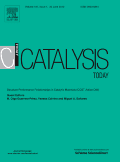
CATALYSIS TODAY
Empowering Catalysis with Cutting-Edge InsightsCATALYSIS TODAY is an esteemed journal published by Elsevier, specializing in the vibrant field of catalysis and its applications in chemical engineering. With the ISSN 0920-5861 and E-ISSN 1873-4308, it has continually contributed valuable research since its inception in 1987 and is set to maintain its influence through 2025. Hailing from the Netherlands, this journal stands out with a notable Q2 quartile ranking in catalysis and a Q1 ranking in miscellaneous chemistry as of 2023, reflecting its rigorous selection of impactful and innovative studies. Its Scopus rankings further substantiate its excellence, highlighting its position in the 89th percentile of general chemistry and 77th percentile in catalysis. CATALYSIS TODAY aims to disseminate cutting-edge findings, fostering exchange among researchers, professionals, and students in the catalysis community. By presenting high-quality research articles, reviews, and case studies, it plays a pivotal role in advancing knowledge and sparking discussions that drive future developments in the field.

RUSSIAN CHEMICAL BULLETIN
Advancing the Frontiers of Chemistry.RUSSIAN CHEMICAL BULLETIN, published by SPRINGER, serves as a pivotal resource in the field of general chemistry, covering a wide array of topics that impact both theoretical and applied chemistry. With an ISSN of 1066-5285 and a presence since 1993, this journal provides a platform for disseminating significant research findings, practical applications, and novel methodologies within the broader chemistry community. While it currently holds a Q3 ranking in the Chemistry (miscellaneous) category and occupies the 230th position out of 408 in the Scopus rankings, its reputation continues to grow, fostering collaboration and innovation among researchers and professionals alike. Although the journal does not offer an open-access model, it is committed to making findings accessible within the academic community, ensuring that valuable insights can inform future research. With an anticipated convergence of studies extending to 2024, the RUSSIAN CHEMICAL BULLETIN remains an essential reference for those dedicated to advancing chemical science.
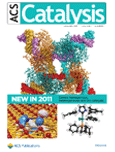
ACS Catalysis
Leading the Charge in Catalytic Research and DiscoveryACS Catalysis, published by the American Chemical Society, stands as a premier journal in the field of catalysis, offering a vital platform for researchers, professionals, and students focused on advancing the science of catalysis and its applications. With an impressive impact factor placing it in the Q1 category for both Catalysis and Chemistry (miscellaneous), this journal has established itself as a leading source of high-quality research findings, currently ranking #21 out of 408 in General Chemistry and #9 out of 68 in Catalysis according to Scopus. Since its inception in 2011, ACS Catalysis has aimed to publish innovative research that addresses the critical challenges in catalytic processes, advancing our understanding of both fundamental and applied aspects of catalysis. With a commitment to promoting open scientific discourse, it serves a vital role for those interested in the latest methodologies, discoveries, and trends in this essential discipline. Based in Washington, DC, ACS Catalysis continues to uphold the highest standards of scholarship and collaboration within the vibrant community of chemists and engineers worldwide.
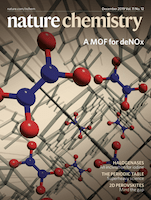
Nature Chemistry
Exploring the Depths of Chemical Discovery.Nature Chemistry is a prestigious journal published by NATURE PORTFOLIO, focusing on groundbreaking research in the realms of chemistry and chemical engineering. Since its inception in 2009, this esteemed publication has garnered significant recognition, currently ranking in the Q1 category for both Chemical Engineering and Chemistry (miscellaneous) as of 2023. With an impactful presence, it ranks 4th out of 273 in General Chemical Engineering and 9th out of 408 in General Chemistry, placing it within the top 2% of journals in its field. Nature Chemistry aims to publish high-quality, peer-reviewed articles that advance our understanding of chemical science and its applications, catering to an audience of researchers, professionals, and students eager to explore innovative discoveries. While it offers various access options, dedicated readers appreciate its contribution to the scientific community from its base in Berlin, Germany.

International Journal of Chemical Engineering
Transforming ideas into impactful chemical solutions.International Journal of Chemical Engineering is a leading peer-reviewed journal published by HINDAWI LTD, dedicated to advancing the field of chemical engineering through innovative research and practical applications. With an impact factor that places it in the Q2 category of Chemical Engineering (miscellaneous), this journal has established itself as a significant resource for researchers and professionals alike, particularly those interested in general chemical engineering topics. Since its transition to Open Access in 2008, the journal has ensured that critical scientific knowledge remains accessible to a global audience, fostering collaboration and interdisciplinary research. With coverage from 2009 to 2024, it continues to be an essential platform for disseminating cutting-edge findings, methodologies, and discussions that shape the future of chemical engineering. For more information, visit their website or access the latest issue directly to explore groundbreaking studies and insights.
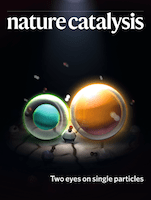
Nature Catalysis
Elevating Catalysis Research to New HeightsNature Catalysis is a premier academic journal published by NATURE PORTFOLIO, specializing in the rapidly evolving fields of biochemistry, bioengineering, and catalysis. With its ISSN of 2520-1158, this journal has emerged as an invaluable resource since its inception in 2018, contributing significantly to interdisciplinary research. Recognized for its high impact within the scientific community, it holds a prestigious Q1 ranking across multiple categories, including Biochemistry, Process Chemistry and Technology, and Catalysis as of 2023, illustrating its influence and authority in the field. Researchers will find impactful articles characterized by rigorous peer review processes that push the boundaries of knowledge in catalysis and its applications. While the journal operates with traditional access models, it remains accessible to a global audience interested in innovative research findings that promise to shape future developments in these critical areas. Positioned at the forefront of contemporary scientific inquiry, Nature Catalysis invites contributions that expand upon catalytic processes and technologies, which are crucial for advancing both fundamental science and applied engineering.
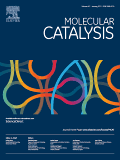
Molecular Catalysis
Connecting Researchers to the Future of CatalysisMolecular Catalysis, published by Elsevier in Netherlands, is a premier academic journal that explores the cutting-edge domain of catalytic science. With an impressive impact factor and classified in the top quartiles (Q2) in various fields such as Catalysis, Physical and Theoretical Chemistry, and Process Chemistry and Technology, this journal stands as a significant resource for researchers and professionals committed to advancing the understanding of catalysis processes. Since its inception in 2017, it has been pivotal in publishing high-quality, peer-reviewed research that addresses crucial challenges and innovations in molecular catalysis. The journal is fully Open Access, allowing unrestricted access to its articles, thus fostering a wider dissemination of knowledge. Recognized for its rigorous editorial standards, it features works that push the boundaries of current scientific understanding, making it an essential platform for students and academics alike to share and grow in their expertise.
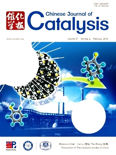
Chinese Journal of Catalysis
Transforming Ideas into Solutions in the World of CatalysisWelcome to the Chinese Journal of Catalysis, a prestigious publication dedicated to advancing the field of catalysis. Published by Elsevier, this journal showcases groundbreaking research and developments in the chemistry of catalysis, emphasizing applications that address global challenges in energy, environment, and sustainability. Since its inception in 1996, the journal has gained recognition, achieving a remarkable impact factor and ranking in the top quartile (Q1) of both Catalysis and Chemistry disciplines as of 2023. With a Scopus ranking of #5 in Catalysis and #14 in General Chemistry, it serves as a vital resource for academia and industry professionals alike. Through its rigorous peer-review process, the journal disseminates high-quality research that not only fosters collaboration among scientists but also encourages innovation. Access to the journal is available through institutional subscriptions, ensuring wide-reaching dissemination of critical findings. Positioned within the vibrant research community in China and beyond, the Chinese Journal of Catalysis plays a pivotal role in shaping the future of catalytic science.

TOPICS IN CATALYSIS
Fostering Collaboration in Catalytic AdvancementsTOPICS IN CATALYSIS is a renowned journal published by SPRINGER/PLENUM PUBLISHERS, dedicated to advancing the field of catalysis and its applications in chemistry and chemical engineering. With its ISSN 1022-5528 and E-ISSN 1572-9028, this journal has been a critical resource since its inception in 1994, encompassing a wide range of research topics and recent advancements within the realm of catalysis, including both fundamental studies and practical applications. As of 2023, it holds a prestigious Q3 ranking in Catalysis and a Q2 ranking in miscellaneous chemistry, reflecting its impact and relevance in the academic community. With a Scopus rank of #128 in General Chemistry and #38 in Catalysis, TOPICS IN CATALYSIS is positioned to be a key contributor to the ongoing dialogue in these fields, fostering innovation and collaboration. While not an open-access journal, it provides institutional access options, ensuring that the latest findings and methodologies are available to researchers, professionals, and students worldwide. This journal is essential for those looking to stay at the forefront of catalysis research and its transformative potential in science and industry.

JACS Au
Unleashing innovative ideas in analytical and organic chemistry.JACS Au, published by the American Chemical Society, is a premier open access journal dedicated to advancing research in the rapidly evolving fields of analytical chemistry, organic chemistry, and theoretical chemistry. Since its inception in 2021, JACS Au has quickly established itself as a leading platform for high-quality research, reflected in its Q1 rankings across multiple categories for 2023, including Organic Chemistry and Analytical Chemistry. The journal focuses on innovative methodologies and applications that drive the discipline forward, making it an essential resource for researchers, professionals, and students alike. With an impressive Scopus ranking, consistently placing in the top tiers of its categories, and offering a broad range of access options for its readership, JACS Au aims to foster collaboration and disseminate transformative ideas that impact the global scientific community. Exploring diverse topics within chemistry, this journal provides a vital conduit for sharing groundbreaking research and enhancing scientific dialogue.